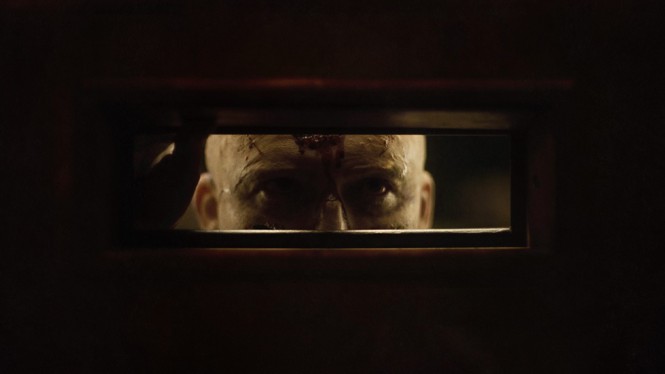
This story contains spoilers for the film Men.
Alex Garland’s film Men has a deceptively simple premise: A woman rents a home in the English countryside to recuperate after a personal tragedy but is soon stalked by several residents of the town. The horror movie is replete with jump scares and potent dread. The biggest quirk is that all the characters threatening her—including a lecherous vicar and a leaf-covered monster—are played by one actor, Rory Kinnear. That phenomenon goes unaddressed for most of the film, until the aggressively bizarre last scenes. There, the movie’s villains are revealed to be more worthy of pity than terror.
When we spoke, Garland told me that he intended the ending to be an “inversion” of typical horror tropes: Instead of needing to defeat a powerful enemy, Harper (played by Jessie Buckley) is confronted with how weak this creature truly is. Indeed, Harper doesn’t really have to do much in the final act of the film. After initially trying to flee her attackers, she is cornered at the vacation home, where she passively witnesses a nightmarish labor. In the climactic scene, Kinnear’s characters literally give birth to one another, in an accelerated chain of gruesome pregnancies and deliveries.
[Read: Alex Garland knows you might hate Men]
Just what the hell is going on? Garland’s film is designed to spur chatter among audience members exiting the theater, much like his previous works Ex Machina and Annihilation (both of which also concluded with shocking, visceral face-offs). Garland seems less concerned with whether the events in Men are actually happening or are instead unfolding in Harper’s head, a way of unpacking her grief over the loss of her husband, James (Paapa Essiedu). We learn through flashbacks that after she asked him for a divorce, James struck her and then seemingly died by suicide—although Harper at one point confesses that she’s not sure whether he intentionally threw himself off their apartment building or simply fell.
For most of Men, the connection between this traumatic incident in Harper’s past and the characters tormenting her in the countryside is unclear. Along with the evil vicar and the naked, mute “Green Man” monster, Kinnear plays a foul-mouthed child, a tutting policeman, a bartender, an aggressive townsperson, and her posh and awkward landlord, Geoffrey. They’re all warped reflections of a traditional image of England, in a landscape where beautiful, rolling hills obscure a blinkered, malevolent society. The vicar presents as a caring adviser but soon becomes scornful; Geoffrey is chummy as he shows Harper around his fancy home at the beginning of the film but attempts to run her down in his car by the end of it.

James haunts these exchanges only through Harper’s intrusive flashbacks—at least until Harper stabs the Green Man in the hand while trying to escape him, leaving a long gash down his arm that resembles an injury James sustained during his death. A little while later, the Green Man’s body starts to morph, revealing a pregnant belly. He rapidly gives birth to the schoolchild, who in turn births the vicar, who then spawns Geoffrey. The final person to emerge from that goopy succession is James, who calmly sits down beside Harper. With equal composure, she asks what he wants. He says he wants her love, a request she seems uninterested in. Soon after, the title card pops up with a cut to black.
Walking out of my screening, I joked that the title should come with an exclamation point, and maybe a rolling-eyes emoji. Harper is under siege by multiple manifestations of toxic masculinity—lechery, neediness, condescension, even Geoffrey’s uncomfortable banter. Though the men, boy, and creature are wildly different, their weird birthing sequence, paired with the film’s pointedly simple title, underscores an elemental bond between them, a shared yearning for attention and love that can quickly turn hostile.
Beyond that throughline, the movie’s symbols are shrouded in ambiguity. The scariest character, the Green Man, has origins in ancient folklore and architecture from many parts of the world, but his motivations in Men, much like the figure’s historical meaning, are profoundly elusive. As man has evolved from the naked, explicitly barbaric mold that the film’s Green Man seems to embody, he’s taken more palatable forms. But in the finale, Garland seems to be intentionally framing them as all part of the same lineage of behavior. The camera also repeatedly turns to the image of the Sheela na gig, a folkloric carving of a woman squatting and holding open her vagina that Harper sees at the local church. As with the Green Man (whose face is also etched into the church walls), historians aren’t quite sure what the Sheela na gig represents—possibly a fertility idol, perhaps a warning against the sins of lust. In this film, contrasted against the climax of male pregnancy, she appears to be an emblem of vaginal envy, of man’s thwarted desire to create rather than destroy.
Despite these resonances, Men is still foundationally mysterious, a film where any answer feels broad and theoretical. Perhaps that’s why the movie hasn’t gone over too well at the box office, opening to a lackluster $3.3 million this weekend and a D+ CinemaScore (an exit survey for theatergoers). But since I saw it a few weeks ago, I’ve enjoyed swirling its strange conclusion around in my head and reveling in Garland’s daring inversion in which the assailant is not destroyed but merely examined. The final message of Men is that for all their scary intent and brute-force behavior, men are inherently, almost cosmically pathetic creations. It’s a funny, ironic, and mordant note to end on after the 90 minutes of unrelenting menace that came before.







